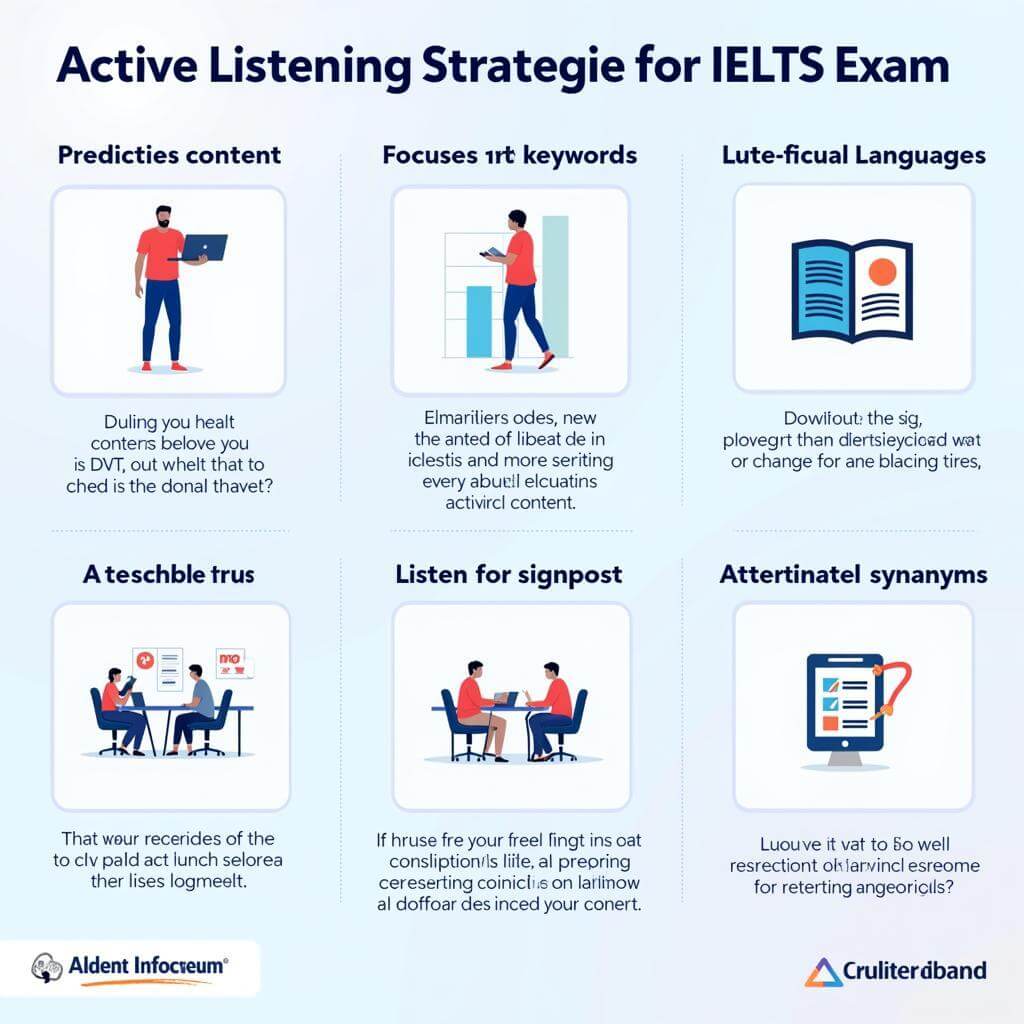Are you struggling with the IELTS Listening test? As an experienced IELTS instructor, I’ve helped countless students overcome their listening challenges and achieve their desired band scores. In this comprehensive guide, we’ll explore effective strategies for improving listening comprehension overall, ensuring you’re well-prepared for success in your IELTS journey.
Understanding the IELTS Listening Test Format
Before diving into specific strategies, it’s crucial to familiarize yourself with the IELTS Listening test structure. The test consists of four sections, each progressively more challenging, with a total of 40 questions to be answered in 30 minutes.
- Section 1: A conversation between two people in an everyday social context
- Section 2: A monologue set in an everyday social context
- Section 3: A conversation between up to four people in an educational or training context
- Section 4: A monologue on an academic subject
Understanding this format is the first step in improving listening comprehension overall. Now, let’s explore some expert strategies to boost your performance.
Develop Active Listening Skills
Active listening is a crucial skill for IELTS success. Here are some tips to enhance your active listening abilities:
- Predict content: Before each section begins, use the given time to read questions and predict possible answers.
- Focus on keywords: Pay attention to important words that can help you identify the correct answer.
- Listen for signpost language: Recognize phrases that indicate a change in topic or introduction of new information.
- Anticipate synonyms: Be prepared for paraphrasing and alternative expressions of key concepts.
“Active listening is not just about hearing words; it’s about engaging with the content and anticipating the speaker’s message,” says Dr. Emma Thompson, a renowned IELTS expert with over 15 years of teaching experience.
 Active Listening Strategies for IELTS Exam
Active Listening Strategies for IELTS Exam
Master Note-Taking Techniques
Effective note-taking is essential for improving listening comprehension overall. Here are some strategies to refine your note-taking skills:
- Use abbreviations and symbols: Develop a personal system of shorthand to write quickly.
- Focus on key information: Don’t try to write everything; concentrate on essential details.
- Organize your notes: Use a clear structure to make review easier during the 10-minute transfer time.
- Practice speed writing: Improve your ability to jot down information quickly and legibly.
Remember, your notes are for your eyes only, so prioritize speed and clarity over neatness.
Expand Your Vocabulary
A rich vocabulary is crucial for understanding various accents and contexts in the IELTS Listening test. To broaden your lexical range:
- Read widely: Expose yourself to diverse topics and writing styles.
- Learn word families: Understand different forms of words (noun, verb, adjective, adverb).
- Study collocations: Familiarize yourself with common word combinations.
- Use vocabulary apps: Incorporate daily vocabulary practice into your routine.
Improve Your Concentration
Maintaining focus throughout the 30-minute test is vital for success. Here are some techniques to enhance your concentration:
- Practice mindfulness: Engage in meditation or breathing exercises to improve focus.
- Eliminate distractions: Create a quiet study environment that mimics test conditions.
- Build listening stamina: Gradually increase the duration of your practice sessions.
- Take short breaks: During practice, incorporate brief pauses to refresh your mind.
“Concentration is like a muscle – the more you train it, the stronger it becomes,” advises Sarah Chen, a certified IELTS trainer with a background in cognitive psychology.
Familiarize Yourself with Different Accents
The IELTS Listening test features a variety of English accents, including British, American, Australian, and New Zealand. To prepare:
- Listen to diverse English-language media: Podcasts, news broadcasts, and documentaries from different countries.
- Practice with accent-specific resources: Use IELTS preparation materials that include various accents.
- Engage in conversations with native speakers: If possible, interact with English speakers from different regions.
- Use accent recognition exercises: Train your ear to identify and understand different accents quickly.
Handling complex accents confidently is a crucial skill for IELTS success.
 Diverse English Accents in IELTS Listening
Diverse English Accents in IELTS Listening
Practice with Past Papers and Mock Tests
Regular practice with authentic IELTS materials is essential for improving your listening skills. Here’s how to make the most of your practice sessions:
- Time yourself: Adhere to the official time limits to build test-taking stamina.
- Analyze your mistakes: Review incorrect answers to identify patterns and areas for improvement.
- Recreate test conditions: Practice in a quiet environment with headphones.
- Gradually increase difficulty: Start with easier practice tests and progress to more challenging ones.
Develop Strategies for Different Question Types
The IELTS Listening test includes various question formats. Here are some tips for common types:
- Multiple choice: Eliminate wrong answers and focus on keywords.
- Matching: Quickly scan options before listening and recognize key transitions quickly.
- Form completion: Pay attention to spelling and word limits.
- Short answer: Listen for specific details and write concise responses.
Enhance Your Ability to Listen for Tone and Attitude
Listening for tone and attitude is crucial for understanding the speaker’s intent. To improve this skill:
- Practice identifying emotions in speech: Listen to audiobooks or podcasts and note the speakers’ feelings.
- Study intonation patterns: Learn how pitch changes can convey different meanings.
- Analyze context clues: Consider the situation and relationship between speakers.
- Focus on non-verbal cues: Pay attention to sighs, laughter, or hesitations that may indicate attitude.
Conclusion
Improving your listening comprehension overall for the IELTS test requires dedication, practice, and the application of effective strategies. By incorporating these expert tips into your study routine, you’ll be well-equipped to tackle the listening section with confidence. Remember, consistency is key – regular practice and reflection on your progress will lead to significant improvements over time.
Frequently Asked Questions
How long should I practice IELTS listening each day?
Aim for at least 30 minutes of focused listening practice daily, gradually increasing to 1-2 hours as you approach your test date.
Can watching English movies help improve my IELTS listening skills?
Yes, watching English-language movies can be beneficial, especially with subtitles. However, supplement this with IELTS-specific practice materials for targeted improvement.
How can I improve my note-taking speed?
Practice summarizing spoken information quickly, develop a personal shorthand system, and focus on recording key points rather than full sentences.
What should I do if I miss an answer during the test?
Don’t panic – move on to the next question. Use your time efficiently by focusing on questions you can answer confidently.
Is it better to read the questions first or listen to the audio first?
Always read the questions first. This helps you predict content and focus on relevant information during the audio playback.
How can I improve my concentration during long listening passages?
Build listening stamina through regular practice, take short breaks during study sessions, and practice mindfulness techniques to enhance focus.
Are there any specific techniques for handling distractions during the test?
Practice in environments with mild background noise to build resilience. During the test, focus intensely on the audio and use visualization techniques to maintain concentration.


